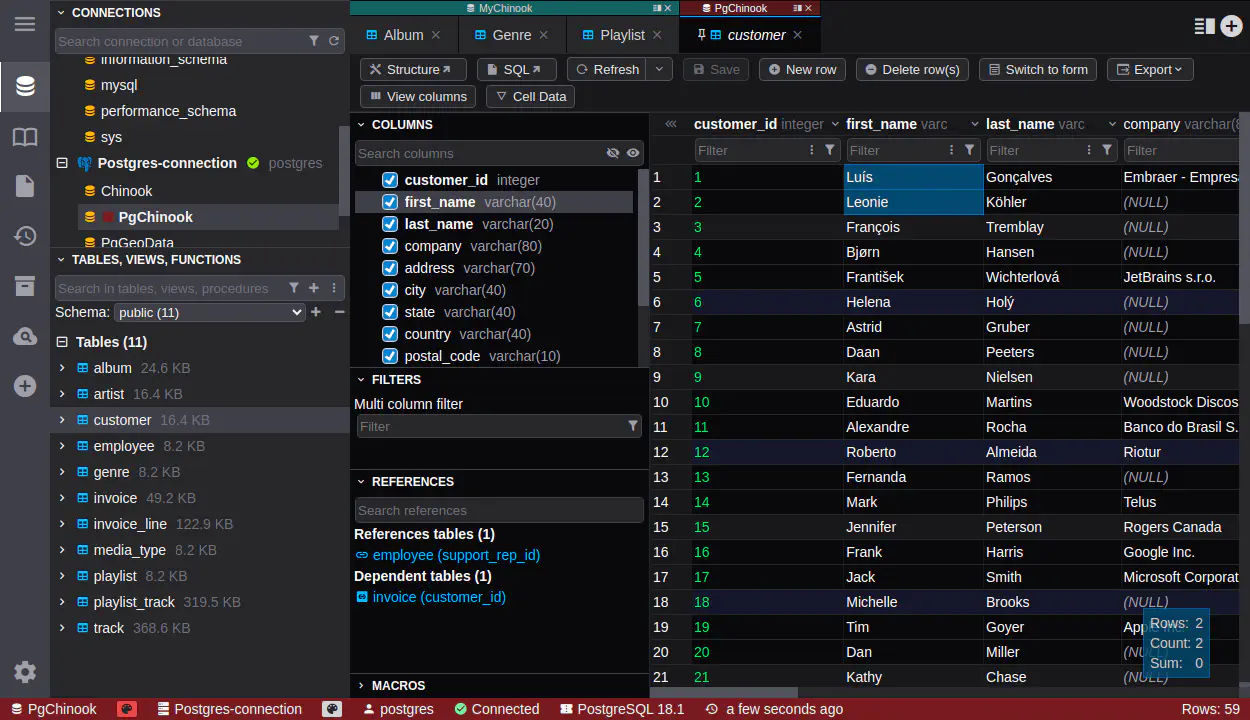DbGate — a modern alternative to phpMyAdmin
If you’ve been using phpMyAdmin for years but crave a more modern experience, meet DbGate. It’s a powerful, cross-platform database manager that goes beyond MySQL — supporting SQL Server, PostgreSQL, MongoDB, and more — while offering both desktop apps and a sleek web interface.
Why teams upgrade from phpMyAdmin to DbGate
Beyond MySQL. While phpMyAdmin is MySQL-only, DbGate handles MySQL, PostgreSQL, SQL Server, Oracle, MongoDB, Redis, and more. Manage all your databases in one tool with a consistent interface.
Desktop and Web included. Get native desktop apps for Windows, macOS, and Linux, plus a modern web interface — all in the free Community edition. Choose the best tool for each task.
Modern, intuitive UX. Clean interface with smart defaults, keyboard shortcuts, and responsive design. No more cluttered navigation trees or confusing multi-step workflows.
Advanced query tools. Powerful SQL editor with syntax highlighting, auto-completion, query history, and result visualization. Execute complex queries with ease.
Built for collaboration. Share connections securely, co-edit queries and ER diagrams, and keep everyone in sync without shuffling files around using DbGate Cloud.
Enterprise-ready security. Single Sign-On (OAuth2/OIDC), external IdPs, Azure Managed Identity, AWS IAM, audit logs, and role-based access control give you enterprise-grade guardrails.
Developers point of view
phpMyAdmin is written in PHP and has been around since 1998, making it one of the oldest database tools still in active use. While it’s battle-tested and reliable, its age shows in the UI and architecture. DbGate, built with modern JavaScript/TypeScript and Electron, offers a contemporary development stack with active community contributions and regular updates.
What makes DbGate feel better
- Multi-database support: Work with MySQL, PostgreSQL, SQL Server, MongoDB, and more — not just MySQL.
- Cross-platform desktop apps: Native applications for Windows, macOS, and Linux with modern UX.
- Modern web interface: Clean, responsive design that works great on any device.
- Advanced SQL editor: Syntax highlighting, auto-completion, query history, and result visualization.
- Schema visualization: Interactive ER diagrams and relationship mapping.
- Team collaboration: Share connections, queries, and diagrams securely with built-in features.
- No PHP/Apache required: Run standalone on desktop or deploy as a Node.js app.
Feature comparison: phpMyAdmin vs DbGate
| Feature | DbGate Community (Free) | phpMyAdmin (Free) |
|---|---|---|
| Cost | Free | Free |
| MySQL support | yes | yes |
| PostgreSQL support | yes | no |
| SQL Server support | yes | no |
| MongoDB & NoSQL | yes | no |
| Desktop applications | yes (Win/Mac/Linux) | no |
| Web interface | yes | yes |
| Modern UX | yes | Limited |
| Advanced query editor | yes | Basic |
| Schema diagrams | yes | Basic |
| Import/Export tools | yes | yes |
| Team collaboration | yes | no |
| Requires PHP/Apache | no | yes |
When to choose DbGate over phpMyAdmin
- Multi-database teams who work with more than just MySQL
- Desktop users who prefer native apps over browser-only tools
- Modern workflows requiring advanced query editing and visualization
- Cross-platform teams needing consistent experience on Windows, macOS, and Linux
- Collaborative environments where teams share connections and queries
- Simplified deployment without PHP/Apache stack requirements
Ready to get started?
Experience the power of DbGate with our comprehensive database management solution
